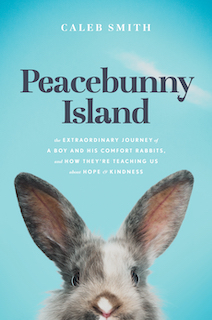
Caleb Smith with a comfort rabbit: ‘We like to say that we rescued the rabbits, and the rabbits rescued us back’
By Duncan Strauss
The chief concerns of many 16-year-olds typically involve getting their driver’s license, the big history test coming Thursday, and–in pre-pandemic times, at least–who they’re going to prom with. Though he may share those concerns, Caleb Smith contends with a larger worry that’s pretty atypical for a teenager: “I have a mortgage on an island, “Smith said in an April Talking Animals interview. “Not many 16-year-olds have a mortgage on an island.”
No kidding. But unusual as this sounds, it only scratches the surface of just how singular the Caleb Smith saga is. For example, the additional details about this island clearly mark Smith as a precocious phenom, in the most favorable sense of that phrase. The size of this island is 22 acres–“16 football fields long,” said Smith, who lives in Minneapolis–and it’s located on the Mississippi River.
He bought the island to create a sanctuary for training his comfort rabbits. Wait! What? Rabbits? I realize this might sound like an odd plot twist, but, as you’ll quickly see, bunnies are actually central to the whole story.
Let’s swing back to the beginning. “It started with a rabbit named Snickers,” Smith recalled, explaining that when he was a much younger kid, his family was looking for a pet, while mindful that his Dad is not a pet person. They’d had a couple of fish but were looking for “a larger animal…and we wanted something that we can really snuggle with,” within the paternal pet limitations.

Featured on WGN News, Caleb Smith gives a tour of Peacebunny Island, talks about training rabbits as comfort animals and explains his program’s rescue efforts.
They settled on a rabbit, in part because Smith’s Mom had one as a child. “We reached out and found this one particular rabbit, a Dutch rabbit whose name was Snickers,” he continued. “He was raised with cats, so he thought he was a cat, which was amazing for our family. He was litterbox trained and would run around the house–he would come up to you and lick you like a cat would. And was just the perfect animal for our family.”
After a blissful time with Snickers, the bunny passed away, and Smith was crestfallen. When he was ready for more animal action, he consulted Craigslist and, thinking bigger this time, the family brought four rabbits into their home. But something was bothering Smith, and this gives us a first glimpse into his preternatural tendency to assess situations and spot problems, large and small, often that others of various ages don’t see, and then formulate a solution. In this instance, when he was perusing Craigslist for bunnies to bring home, it was just after Easter, and he noticed there were more than 300 rabbits for sale in the Minneapolis area alone. Because he’s kindhearted, Smith gave this slew of what many of us would consider irresponsible owners/impulse buyers a pass (“everybody has good expectations, but life happens”)–and set out to do something about it.

Angora rabbits grow one inch of hair every month. Caleb and his team give them gentle haircuts and sells the hair (‘people can make yarn out of it, then they can knit with it,’ he explains)—one of the several micro-businesses that supports Peacebunny Island
He thought long and hard about the situation, pondering ways to educate prospective rabbit owners on the realities of what to expect before they bring the animal home. Looking back now, he said “They had a good heart and they had good intentions, but they just didn’t really have enough knowledge to go into it. So, we focused on an educational program and on the prevention side, hoping we can prevent the pet abandonment cycle from there.”
There are at least two notable aspects of his proposing this program to his parents and enlisting their help. “I put on my church suit and walked down the hallway, like I was on Shark Tank and pitched the idea to my parents after seeing the rabbits on Craigslist, and once my heart broke.” So, beyond the suit and Shark Tank-like pitch, what else was notable about this meeting? At the time, Smith was eight years old.
A lot has happened since, and the evolution of his program has been big and wide-inspired and inspiring. In the early days, Smith and his volunteers (and, often, one or both parents) would take their rabbits to kids’ birthday parties and other events, like book clubs, corporate gatherings, bachelorette parties, and more. Later, the “comfort rabbits” are also brought to senior citizen facilities and hospice wards, instilling in those residents a profound sense of calm, and, yes, comfort.
With his longtime (especially for a 16-year-old!) devotion to kindness and humanity, Smith may be reflecting a genetic bent: His parents hold a commitment to serving those who’ve experienced disaster and/or tragic loss, traveling as part of a group of people with a similar commitment to the sites of mass shootings and other tragedies, providing support and comfort.

Caleb Smith featured on Minnesota’s ABC affiliate KSTP in a segment from the 2019 Minnesota State Fair
“Before I was born, both my parents went [to New York] after 9/11, and worked with the disaster relief there,” Smith said, noting that he grew up recognizing that when a disaster made the news, his parents might well deploy to that site, and, either way, it was important to keep the victims “in mind or pray for them, knowing that they’re going through difficult times. So, I’ve learned from them about empathy.”
An only child, Smith was accompanying his parents on one of these missions–to the site of the Sandy Hook school shooting–that prompted him to expand his enterprise in way that also expanded the dimension of the term “comfort rabbit.”
Another entity that has been traveling to the locations of disaster or trauma for a number of years is the Lutheran Church Charities, Canine Comfort Dogs Ministry, which was launched in 2008 and has more than 60 dogs that have been specially trained to deploy to scenes where humans have experienced unspeakable tragedy and, often, dramatic loss. (The focus of a Talking Animals program on May 29, 2013.)
While in Newtown, Smith observed the Comfort Dogs in action and, a bit later, experienced a lightbulb moment while at a nearby garden area called The Pleasance, which Smith described as featuring rabbit statues that kids could interact with. He remembered thinking, If we had real rabbits, it would make an even huger impact. And then: I have rabbits. So, I made that connection.”
It wasn’t long before Smith–under the “Peacebunny” banner of his ever-growing, ever more professional nonprofit–was offering the services of his comfort rabbits, Comfort Dog-like, to places and peoples who had absorbed serious tragedies, including the high school shooting in Parkland, Florida, where he brought four bunnies.
 As the operation grew, so did his population of rabbits, greatly exceeding the four bunnies per household allowed by Minneapolis law. At first, the rabbits were living, four at a time, at the homes of neighbors, friends and Peacebunny volunteers. But then, in a precocious move that may have presaged his purchase of the island, Smith rented a farm where the bunnies could reside en masse, now called Peacebunny Cottage.
As the operation grew, so did his population of rabbits, greatly exceeding the four bunnies per household allowed by Minneapolis law. At first, the rabbits were living, four at a time, at the homes of neighbors, friends and Peacebunny volunteers. But then, in a precocious move that may have presaged his purchase of the island, Smith rented a farm where the bunnies could reside en masse, now called Peacebunny Cottage.
Along those lines, in a prelude to the island purchase, he bought a houseboat. Again, all these transactions were conducted before he turned 16. Of course, now that he is 16, on the heels of all these adult accomplishments, he’s published a memoir of sorts, Peacebunny Island: The Extraordinary Journey of A Boy And His Comfort Rabbits and How They’re Teaching Us about Hope & Kindness.
The book provides detailed accounts of a journey from little kid who wanted a pet–a universal story–and heeded a fundamental drive to improve life for humans and rabbits, spawning a multifaceted, thriving concern, over which this teenage Eagle Scout presides as CEO; a seemingly universal story unspools into a one-of-a-kind tale, truly distinctive.
Not coincidentally, perhaps, Peacebunny Island is lightly laced–as was our radio conversation–with references to religious beliefs, church (remember: Smith put on his “church suit” to pitch his rabbit program to his parents) and the Bible. I asked him what role faith plays in what he does.
“It’s really the foundation and the cornerstone of what the business was formed off of,” he said, “and having the same value system. And, knowing that they’re not my rabbits–they’re God’s rabbits. I just get to take care of them. So, we need to share them with as many people as possible, because they’re not my rabbits.”
Clearly, Smith feels no claim to ownership of the bunnies he’s responsible for feeding, housing, training, and otherwise caring for. But over the years, his fondness for rabbits may have only grown deeper–certainly when asked what makes a rabbit such an ideal animal to comfort people, he practically gushes.
“They’re very quiet animals,” he said. “In our program, we train them to sit in wagons, and up on tables, so that you can move them around very easily. So, when you go into a senior center, [the people are] all in a circle, sitting down, and we can bring the rabbit around, or they could interact with them in the wagon, as we go around the circle.
“That is beneficial to both the humans receiving it, but it’s also beneficial for the rabbit because they get to interact and play with people, and they can get loved on…And rabbits have these really big ears, so they’re very good at listening to people. So, when they interact with them, people can tell their secrets to the rabbits…
“When we go to these different places, we like to say that we rescued the rabbits, and the rabbits rescued us back.”
Listen to the Caleb Smith interview on Talking Animals
 Combining his passions for animals, radio, journalism, music and comedy, Duncan Strauss launched Talking Animals at KUCI in California in 2003. Since late 2005 the show has aired on Tampa’s WMNF. Producer-host Strauss lives in Jupiter Farms, FL, with his family, including four cats, two horses and one dog. He spends each day talking to those animals, and maintains they talk right back to him, a claim as yet unverified by credible sources.
Combining his passions for animals, radio, journalism, music and comedy, Duncan Strauss launched Talking Animals at KUCI in California in 2003. Since late 2005 the show has aired on Tampa’s WMNF. Producer-host Strauss lives in Jupiter Farms, FL, with his family, including four cats, two horses and one dog. He spends each day talking to those animals, and maintains they talk right back to him, a claim as yet unverified by credible sources.


